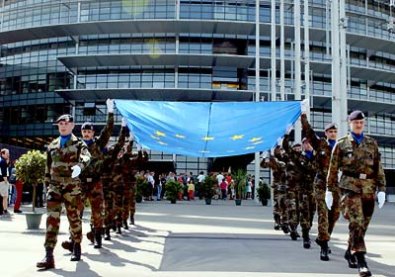
From Thomas Enders and Wolfgang Ischinger, Munich Security Conference: Demands are growing – as the recent crises in Mali and Libya illustrate – even as defence budgets steadily decline. . . .
It is clear that Europe will bear increasing responsibility for its own security in our immediate surroundings. While the missions in Libya and Mali, among others, have shown that Europe can achieve far more than we often expect, we are still far from having the spectrum of military capabilities needed to master such tasks alone. In many cases, we remain dependent on our American partners – for example, for air refuelling during both the Mail and Libya missions. . . .
In light of this situation, Europe – especially Germany, France, and Great Britain – should reach agreement on three aspects of joint defence:
1. The strategic objective. What strategic set of capabilities does Europe want to maintain with pooling and sharing, as well as with new programs? Given its complex value chains, the defence industry needs a concrete strategic outlook in order to support these objectives.
2. The extent of shared sovereignty. Even without a European army, “sharing capabilities” still entails a giving up some sovereignty in return for effectiveness. But such trade-offs need not be absolute: shared capabilities can be flexibly separated out for individual missions. The “red card” arrangements used by the European Air Transport Command offer just one example of such successful integration.
3. The design of the market. How much should the market economy impact defence? If we want efficient structures on the supply side, avoiding consolidation and privatization is not an option. Our quality technology can only prevail in the intensifying global competition for emerging markets with competitive prices and greater economies of scale. The European Defence Agency (EDA) should use its own budgets and its mandate to manage research and development programs to create the institutional prerequisites for competitiveness. The European Space Agency already provides a civilian blueprint – all that is lacking is political will. A merger of the EDA and OCCAR (the Organisation for Joint Armament Cooperation) could be a useful step toward more intensive collaboration.
There is no question that pursuing such decisions and increasing our dependence on one another requires courage and mutual trust. But this is what defines Europe: the realization that a common market and political community give rise to new capabilities. The time has come to put these principles into practice for Europe’s security and defence as well.
Thomas Enders is CEO of EADS. Ambassador Wolfgang Ischinger is Chairman of the Munich Security Conference. A German version of this Monthly Mind appeared in the German newspaper Handelsblatt on April 26, 2013. (photo: Cafe Babel)
Image: cafe%20babel%207%2011%2011%20EU%20defense_1.jpg
